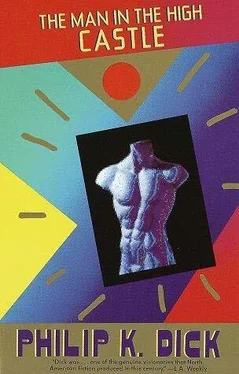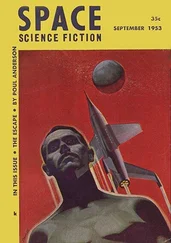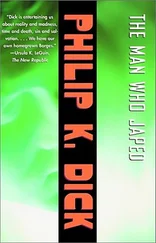Idiotic daydreaming of fugal type, he thought. Emulation of more noxious aspects of adolescence, rather than the clearheaded pristine innocence of authentic childhood. Just what I deserve anyhow.
All my own fault. No intention by Mr. R. Childan or artisans; my own greed to blame. One cannot compel understanding to come.
He counted slowly, aloud, and then jumped to his feet. “Goddam stupidity,” he said sharply.
Mists cleared?
He peeped about. Diffusion subsided, in all probability. Now one appreciates Saint Paul’s incisive word choice seen through glass darkly not a metaphor, but astute reference to optical distortion. We really do see astigmatically, in fundamental sense: our space and our time creations of our own psyche, and when these momentarily falter—like acute disturbance of middle ear.
Occasionally we list eccentrically, all sense of balance gone.
He reseated himself, put the silver squiggle away in his coat pocket, sat holding his briefcase on his lap. What I must do now, he told himself, is go and see if that malignant construction—what did the man call it? Embarcadero Freeway. If it is still palpable.
But he felt afraid to.
And yet, he thought, I can’t merely sit here. I have loads to lift, as old U.S. folk expression has it. Jobs to be done.
Dilemma.
Two small Chinese boys came scampering noisily along the path. A flock of pigeons fluttered up; the boys paused.
Mr. Tagomi called, “You, young fellows.” He dug into his pocket. “Come here.”
The two boys guardedly approached.
“Here’s a dime.” Mr. Tagomi tossed them a dime; the boys scrambled for it. “Go down to Kearny Street and see if there are any pedecabs. Come back and tell me.”
“Will you give us another dime?” one of the boys said. “When we get back?”
“Yes,” Mr. Tagomi said. “But tell me the truth.”
The boys raced off along the path.
If there are not, Mr. Tagomi thought, I would be well advised to retire to secluded place and kill myself. He clutched his briefcase. Still have the weapon; no difficulty, there.
The boys came tearing back. “Six!” one of them yelled. “I counted six.”
“I counted five,” the other boy gasped.
Mr. Tagomi said, “You’re sure they were pedecabs? You distinctly saw the drivers peddling?”
“Yes sir,” the boys said together.
He gave each boy a dime. They thanked him and ran off.
Back to office and job, Mr. Tagomi thought. He rose to his feet, gripping the handle of his briefcase. Duty calls. Customary day once again.
Once more he walked down the path, to the sidewalk.
“Cab!” he called.
From the traffic a pedecab appeared; the driver came to a halt at the curb, his dark face glistening, chest heaving. “Yes sir.”
“Take me to the Nippon Times Building,” Mr. Tagomi ordered. He ascended to the seat and made himself comfortable.
Peddling furiously, the pedecab driver moved out among the other cabs and cars.
It was slightly before noon when Mr. Tagomi reached the Nippon Times Building. From the main lobby he instructed a switchboard operator to connect him with Mr. Ramsey upstairs.
“Tagomi, here,” he said, when the connection was complete.
“Good morning, sir. I am relieved. Not seeing you, I apprehensively telephoned your home at ten o’clock, but your wife said you had left for unknown parts.”
Mr. Tagomi said, “Has the mess been cleared?”
“No sign remains.”
“Beyond dispute?”
“My word, sir.”
Satisfied, Mr. Tagomi hung up and went to take the elevator.
Upstairs, as he entered his office, he permitted himself a momentary search. Rim of his vision. No sign, as was promised. He felt relief. No one would know who hadn’t seen. Historicity bonded into nylon tile of floor.
Mr. Ramsey met him inside. “Your courage is topic for panegyric down below at the Times ,” he began. “An article depicting—” Making out Mr. Tagomi’s expression he broke off.
“Answer regarding pressing matters,” Mr. Tagomi said. “General Tedeki? That is, quondam Mr. Yatabe?”
“On carefully obscure flight back to Tokyo. Red herrings strewn hither and yon.” Mr. Ramsey crossed his fingers, symbolizing their hope.
“Please recount regarding Mr. Baynes.”
“I don’t know. During your absence he appeared briefly, even furtively, but did not talk.” Mr. Ramsey hesitated. “Possibly he returned to Germany.”
“Far better for him to go to the Home Islands,” Mr. Tagomi said, mostly to himself. In any case, it was with the old general that their concern, of important nature, lay. And it is beyond my scope, Mr. Tagomi thought. My self, my office; they made use of me here, which naturally was proper and good. I was their—what is it deemed? Their cover.
I am a mask, concealing the real. Behind me, hidden, actuality goes on, safe from prying eyes.
Odd, he thought. Vital sometimes to be merely cardboard front, like carton. Bit of satori there, if I could lay hold of it. Purpose in overall scheme of illusion, could we but fathom. Law of economy: nothing is waste. Even the unreal. What a sublimity in the process.
Miss Ephreikian appeared, her manner agitated. “Mr. Tagomi. The switchboard sent me.”
“Be cool, miss,” Mr. Tagomi said. The current of time urges us along, he thought.
“Sir, the German consul is here. He wants to speak to you.” She glanced from him to Mr. Ramsey and back, her face unnaturally pale. “They say he was here in the building earlier, too, but they knew you—”
Mr. Tagomi waved her silent. “Mr. Ramsey. Please recollect for me the consul’s name.”
“Freiherr Hugo Reiss, sir.”
“Now I recall.” Well, he thought, evidently Mr. Childan did me a favor after all. By declining to reaccept the gun.
Carrying his briefcase, he left his office and walked out into the corridor.
There stood a slightly built, well-dressed white. Close-cut orange hair, shiny black European leather Oxfords, erect posture. And effeminate ivory cigarette holder. No doubt he.
“Herr H. Reiss?” Mr. Tagomi said.
The German bowed.
“Has been fact,” Mr. Tagomi said, “that you and I have in times past conducted business by mail, phone, et cetera. But never until now saw face to face.”
“An honor,” Herr Reiss said, advancing toward him. “Even considering the irritatingly distressing circumstances.”
“I wonder,” Mr. Tagomi said.
The German raised an eyebrow.
“Excuse me,” Tagomi said. “My cognition hazed over due to those indicated circumstances. Frailty of clay-made substance, one might conclude.”
“Awful,” Herr Reiss said. He shook his head. “When I first—”
Mr. Tagomi said, “Before you begin litany, let me speak.”
“Certainly.”
“I personally shot your two SD men,” Mr. Tagomi said.
“The San Francisco Police Department summoned me,” Herr Reiss said, blowing offensive-smelling cigarette smoke around them both. “For hours I’ve been down at the Kearny Street Station and at the morgue, and then I’ve been reading over the account your people gave to the investigating police inspectors. Absolutely dreadful, this, from start to finish.” Mr. Tagomi said nothing.
“However,” Herr Reiss continued, “the contention that the hoodlums are connected with the Reich hasn’t been established. As far as I’m concerned the whole matter is insane. I’m sure you acted absolutely properly, Mr. Tagori.”
“Tagomi.”
“My hand,” the consul said, extending his hand. “Let’s shake a gentlemen’s agreement to drop this. It’s unworthy, especially in these critical times when any stupid publicity might inflame the mob mind, to the detriment of both our nations’ interests.”
Читать дальше










